Free Republic of Schwanensee
Free Republic of Schwanensee | |||||||
|---|---|---|---|---|---|---|---|
| Motto: Deus iudex meus | |||||||
| Anthem: Forest Rhapsody | |||||||
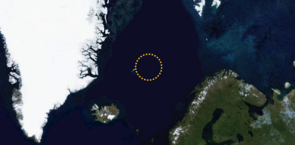 The map shows the location of Schwanian mainland | |||||||
| Capital | Novurbo | ||||||
| Largest city | Leto | ||||||
| Official languages | Esperanto, Volapük, Latin | ||||||
| Demonym(s) | Schwanian (Cignolaga) | ||||||
| Government | Cosmopolitan meritocracy | ||||||
• President | Daniel C. | ||||||
• Prime Minister | Margaret C. | ||||||
| Legislature | Nulasvanadail (2011-2014) Provisional Supreme Soviet (2019) | ||||||
| Establishment | 26 June 2009 (as Ceskonia) 8 September 2011 (as LRC) | ||||||
| Population | |||||||
• Census | 13 (as of Dec. 2019) | ||||||
| Currency | Schwanian Krone (Kr.) | ||||||
| Time zone | UTC-1, etc. | ||||||
| |||||||
Schwanensee (Swan Lake), officially in Esperanto la Libera Respubliko de Cignolago (Free Republic of Schwanensee, formerly la Sendependa Libera Kosmopolitisma Respubliko de Cignolago), was a cosmopolitan meritocracy which declared its main territory on a virtual platform supposedly located in the Arctic Ocean along with several peripheral territories around the globe. As of 2019, the country had a population of 13 and claimed a total area of roughly 750 sqm., with its capital city in Novurbo (in English: New City).
Schwanensee was a cosmopolitan meritocracy: its citizens scattered in different parts of the world, meanwhile strictly classified into three social classes: Clerici (the Scholars), Guverans (the Administrators), and la Popolo (the People). These social classes were mainly based on their skills and their own choices on occupation, since every social class would be designated specified occupations or professions. Social class did not depend on one's origin, and every citizen had two opportunities after having acquired their Schwanian citizenship to alter the social class they belonged to. Some of the Schwanian territories, however, chose not to implement the social class system, such as the Autonomous Communist Region of Ruĝflago and the utopian settlements of Elysia.
The country adopted three universal languages as its official languages, namely Esperanto, Volapük, and Latin, while German, Mandarin Chinese, English, and Japanese were some of the unofficial but recognized languages used more widely in daily life among citizens. Each official language was assigned to a specific social class as its sole language, and a language examination (no longer mandatory since October 2019) would be given before a new citizen could be assigned to any of the three social classes. In general, Esperanto served as the language of the people (also for foreign affairs, etc.), Volapük as the language of administration, and Latin as the language of academic research.
On 25 Dec. 2019, the 4th President of Schwanensee formally declared the dissolution of the country due to most of its population leaving the micronational community. A possible revival was proposed in late 2023 but was not yet ratified as of yet.
History
Republic of Ceskonia (2009 - 2011)
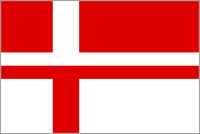

The history of Schwanensee began with a whimsical idea of its First President, Richard C., who created the predecessor of Schwanensee, a cyberstate known as the Republic of Ceskonia, on 26 June 2009 while he was studying in Osnarbrück, Germany. Richard had been well aware of the famous micronations around the globe, yet he was against such hard successionism, which he personally deemed problematic. The booming development of Internet-based micronations at the time, however, had facilitated his creation of a similar simulationist cyberstate, which would not claim any physical territories.
Hoping to achieve more interested participants, Richard chose to launch the project of the new cyberstate both on a Chinese blogging site similar to Blogspot (now already defunct) and separately on a German webhosting platform - both languages he spoke fluently. To his surprise, he noticed that the Chinese blogging site had already hosted a number of similar cyberstates (known as virtual states). The first cyberstate with which Ceskonia pursued diplomatic relationship was the Goryeo Federation, on the same day when Ceskonia was founded (26 June 2009). During the 2-year lifespan of Ceskonia, Richard C., representing the Republic of Ceskonia, eventually built friendly diplomatic relations with more than a hundred of such cyberstates, whereas the only contact of Ceskonia with the broader English-speaking micronational community during this time was with the Micras Sector, i.e., the registration of its forum under its previous English name to the once famous ForumList by dr-spangle.
During this time period, most background information on Ceskonia was based purely on fantasy rather than on reality - a typical trend for Chinese virtual states and German-speaking simulationist μnations. Ceskonia had its capital city named Syldavia, and national symbols as well as postage stamps and banknotes were also designed by Richard for his cyberstate. Despite the fact that the latter were never materialized, Ceskonia founded the Online Numismatic Museum for Virtual States as a separate blog, hosting banknotes from a number of virtual states based on the same platform. Ceskonia also hosted the 2nd CyberOlympics and became a founding member of Liberal Union, one of the three international organizations among virtual states at the time.
As Daniel C. joined Ceskonia and served as its Prime Minister in 2011, both of the citizens eventually agreed to expand its influence so that Ceskonia would pay more attention to the international micronational community outside of its original Chinese and German-speaking platforms, partly due to a previous notification from the Chinese blogging site that its service would soon be suspended. The message had been catastrophic to many virtual states that utilized its services (incl. blog and message board, etc.), and attempts had been made in prior as to how Ceskonia could survive this: President Richard, who intended to stay connected with other virtual states, launched an online forum, whose service was supported by the same company of the blogging site but not interrupted by this mishap, yet the environment there was quite hostile; Prime Minister Daniel, who favored an international solution, tried on the NationStates forum, which led him discovering the MicroWiki Forum, a platform that both of them regarded as friendly and feasible.
Free Republic of Schwanensee (2011 - 2019)

On 8 September 2011, Ceskonia officially changed its name to Zwanenmeer (and later to its German equivalent Schwanensee) with newly designed national symbols and joined MicroWiki, gradually bidding farewell to its completely simulationist, Internet-based past. Nonetheless, Schwanensee in its early days was still inevitably partly related to fictional fantasy (the legacy of which was the Schwanian Lomiän, the virtual platform on which the Schwanian capital was supposed to exist), though reality had also come to play a role in it - It also claimed physical territories in Germany and USA, etc., where its citizens resided at the time, and proclaimed German, Chinese, and Schwanian, at first only a script, but later also a separate constructed language, to be its three official languages. Furthermore, banknotes, stamps, and documents were also prepared and produced, with the hope that Schwanensee could more resemble a "real" micronation.
Before President Richard quit the project unexpectedly in 2013, he and Prime Minister Daniel had attempted to interact with micronations around the globe, not only on MicroWiki forum but also on Micras and MN-Marktplatz, participating in the Micras Expo 2012 and the 2012 MicroWiki Cup, etc. Such activity gradually disappeared as many citizens eventually became inactive, resulting in the implementation of the Emergency Act in 2014 dissolving the Schwanian parliament and extending the presidential term indefinitely. The inertia was also accompanied by an expected halt to the service provided by the Chinese blogging site in 2015, on which the predecessor of Schwanensee, Ceskonia, had been established.
Schwanensee became rather dormant until 2017, as President Daniel reformed the country by implementing uniform and standardizing policies over all of its territories around the globe, meanwhile adopting newly designed national symbols, etc. The social class system was implemented during this time period, followed by the change of official languages to Esperanto, Volapük, and Latin. Furthermore, national paraphernalia were manufactured with much higher quality and were issued accordingly: all active citizens could receive their own identity cards and passports - on which they would be given a valid visa once they entered any Schwanian territories - for free as long as they applied for them, and salaries were distributed in kronen as banknotes and coins, which they could use within Schwanian territories for goods. In addition, professionally made Schwanian postage stamps were issued and used on domestic stationeries and international letters sent from Schwanensee to other micronations. The two special regions, Elysia and Ruĝflago, were also planned at this time in order to test the viability of other possible ideologies.
Such activity, however, was not accompanied by any increase in population. The population of Schwanensee had decreased to approximately 13 by the end of 2019, while only 3~5 of them remained active in daily affairs. An attempt to revive the country, namely the Cyrillization Movement, occurred in October 2019, during which the country underwent a pro-Soviet transformation: introducing the new coat of arms, adopting liberation theology as its guiding ideology, abolishing many of its meritocratic policies, meanwhile having its official languages written entirely in Cyrillic instead of the Latin alphabet (it was also planned at the time to promote Esperanto as the only official language of the country). The movement ultimately failed, with the remaining few active citizens reaching an accord in Lespedezo, then de-facto capital of Schwanensee, to formally dissolve the country on Christmas Day 2019.
Proposed revival (2023)
While Schwanensee as a micronation was formally declared as dissolved in 2019, its culture continues to have an important role within its former territories and among some of the former citizens. Since late 2023, there have been several proposals to revive the micronation as a simulationist one, but no official plans have been ratified as of yet.
Geography
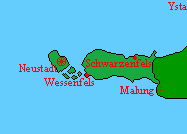
The country was divided into four Provincoj or Provins (provinces: Lomiän, Rubainiän, Smaragainiän, Safirainiän) and two Regionoj or Ziläks (special regions: Elysia, Ruĝflago). The four provinces were further divided into two Urboj or Zifs (cities) and seven Kantonoj or Kantons (counties). Unlike most countries in the world, Schwanian citizens were not permitted to enter any other Schwanian territories apart from the one that they belong to, unless they had been issued an internal entry visa valid for their destination on their Schwanian passport prior to their journey.
From February to December 2012, Schwanensee also participated in the Micras world and claimed a rather small piece of land on the planet. Its territory on Micras resembled the virtual platform of Lomiän and claimed to have three cities, namely Neustadt (capital city of the Micras territory), Schwarzenfels, and Wessenfels.
Cities, counties, and regions
- Novurbo was the de-jure capital city of the country. It was located on the virtual platform Lomiän, and was the only city within this province. The city had a population of 0.
- Leto was the largest city of the country. It was located in Rubainiän. As of 2019, it had a population of 3~4, thus the largest city of the country. It also served as the first headquarter of the entire Schwanian government (Bevünetaguveranef) from 2011 to 2017, thus making it the de-facto capital of the country during this time.
- Varenko was located in Rubainiän with a population of 1.
- Ravnhaŭso was located in Rubainiän with a population of 2.
- Acerrivero was located in Rubainiän in Tokyo, Japan with a population of 1.
- Aŭznŝtato was located in Smaragainiän in London, UK with a population of 1.
- Sororiso was located in Smaragainiän in Münich, Germany with a population of 1.
- Hojro was located in Safirainiän in New York, USA with a population of 1.
- Lespedezo was located in Safirainiän in St. Louis & Chicago, USA with a population of 2~3. It served as the second headquarter of the Schwanian Bevünetaguveranef (thus the second de-facto capital of the country following Leto) from 2017 until the dissolution of the country. The Schwanian embassy to the United States of America was also located in Lespedezo.
- Elysia was a combination of planned autonomous utopian settlements (also known as phalansteries) within the country. It adopted Elysian, a constructed language, as its sole official language.
- Ruĝflago was a planned autonomous communist region in which communism with agriculture-based economy would be implemented. Esperanto was the only official language of the region.
Politics

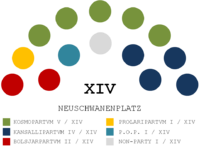
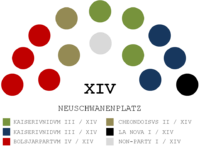
Later a cosmopolitan meritocracy, Schwanensee had previously been a parliamentary republic. The country had a left–right multi-party system: following the 2013 parliamentary election, the biggest parties were the centre-right National Party and the centrist Green Party. Other political parties with seats in the Schwanian parliament (originally Neuschwanenplatz, later known as Nulasvanadail), were the centre-left Bolshevik Party, etc., while other parties existed on the municipal level. According to the Constitution, parties promoting racism were strictly prohibited within the country.
Starting from late 2014, the parliament system had been temporarily abolished due to the Emergency Act in action, which was proposed due of a lack of active citizens for a long time. Since then, the presidential term had been prolonged indefinitely, and the office of Prime Minister was also left unoccupied until a new candidate was appointed in late 2018 by its President. Under the Emergency Act, the President also served as the Minister for Foreign Affairs, whereas the Prime Minister served as the Minister for Internal Affairs. The Emergency Act was eventually lifted during the Cyrillization Movement starting from October 2019, resulting in the establishment of the Provisional Supreme Soviet (Cyrillic Esperanto: Провизора Супера Совето) in Lespedezo, yet the movement ultimately failed due to the dissolution of the country in late 2019.
List of parliamentary parties
![]() Green Party
Green Party
![]() Bolshevik Party
Bolshevik Party
![]() National Party
National Party
![]() Universalist Party
Universalist Party
![]() Public Opinion Party
Public Opinion Party
Democratic-Libertarian Party(1)
Cheondoist Party(1)
![]() Cosmopolitanist-Nationalist Coalition(2)
Cosmopolitanist-Nationalist Coalition(2)
(1): Banned due to their Fascist ideology.
(2): Split into two different parties.
List of Presidents (Prezidantoj or Presidals)
List of Prime Ministers (Kancelieroj or Lebürals)
Gallery
-
National flag displayed in Leto, the largest city of Schwanensee
-
National flag displayed in Lespedezo, headquarter of the Bevünetaguveranef
-
Warning sign on Schwanian border with USA (Lespedezo)
-
Flag of Elysia (obverse) - reverse bearing the regional coat of arms
-
Flag of the Autonomous Communist Region of Ruĝflago
-
Flag of Schwanian Mainland, Lomiän
-
Flag of the government of Schwanian Mainland, Lomiänaguveranef
-
Proposed emblem of the Schwanian Armed Forces
-
Coins and banknotes of the Schwanian krone
-
Bankbook issued by the Schwanian central bank, KosmoBanko de Cignolago
-
Schwanian postage stamps featuring Albert Anker's paintings
-
Used envelope bearing a Schwanian stamp and the postmark of Lespedezo
-
Four types of Schwanian passports: Official, Diplomatic, Ordinary, Temporary
-
Entry and exit stamps of Schwanensee stamped on a Schwanian passport
Foreign relations
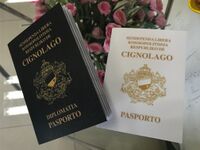

Micronational foreign relations
Note: excluding virtual states and μnations
 European Community of Micronations
European Community of Micronations Artaghe
Artaghe Bascal
Bascal Chanserly
Chanserly Empire of Choseon
Empire of Choseon Duke
Duke Indokistan
Indokistan Juclandia
Juclandia Karnia-Ruthenia
Karnia-Ruthenia Kuhugstan
Kuhugstan Leylandiistan
Leylandiistan LPRoR (Physical documents exchanged)
LPRoR (Physical documents exchanged) Mahuset
Mahuset Mjölnir
Mjölnir Myrotania
Myrotania NovaTroie (Physical treaty exchanged)
NovaTroie (Physical treaty exchanged) Padrhom (Physical treaty exchanged)
Padrhom (Physical treaty exchanged) Quixotica (Physical documents exchanged)
Quixotica (Physical documents exchanged) Safiria
Safiria Shurigawa
Shurigawa Sirocco
Sirocco SMORA (Physical treaty exchanged)
SMORA (Physical treaty exchanged) Southern California
Southern California St. John
St. John Sunset Micronation
Sunset Micronation Templar Kingdom
Templar Kingdom UTSH
UTSH Varina
Varina Vetria
Vetria WUSSR
WUSSR Wyvern
Wyvern Xenostrov (Physical treaty exchanged)
Xenostrov (Physical treaty exchanged) Zercit
Zercit
















